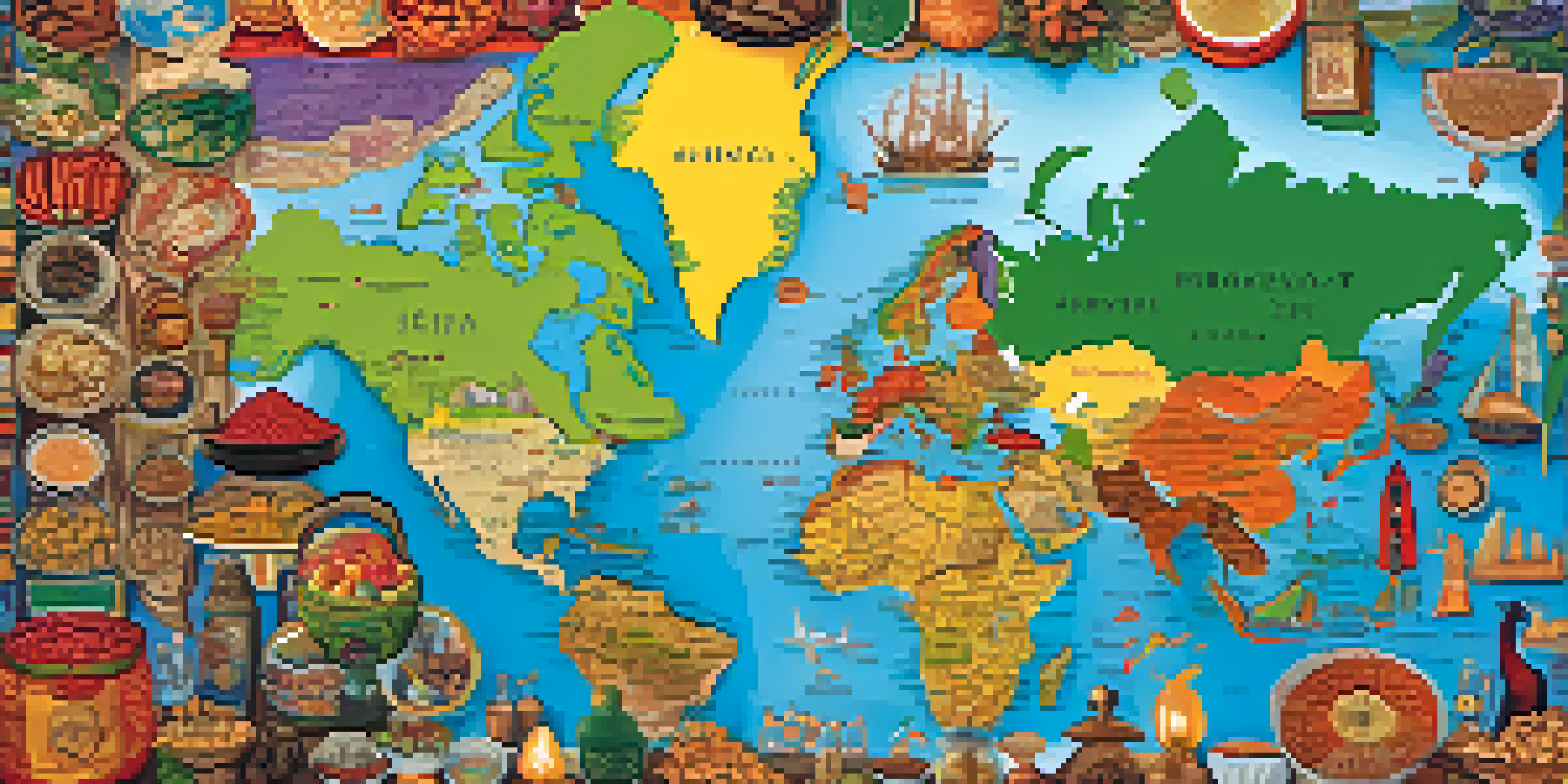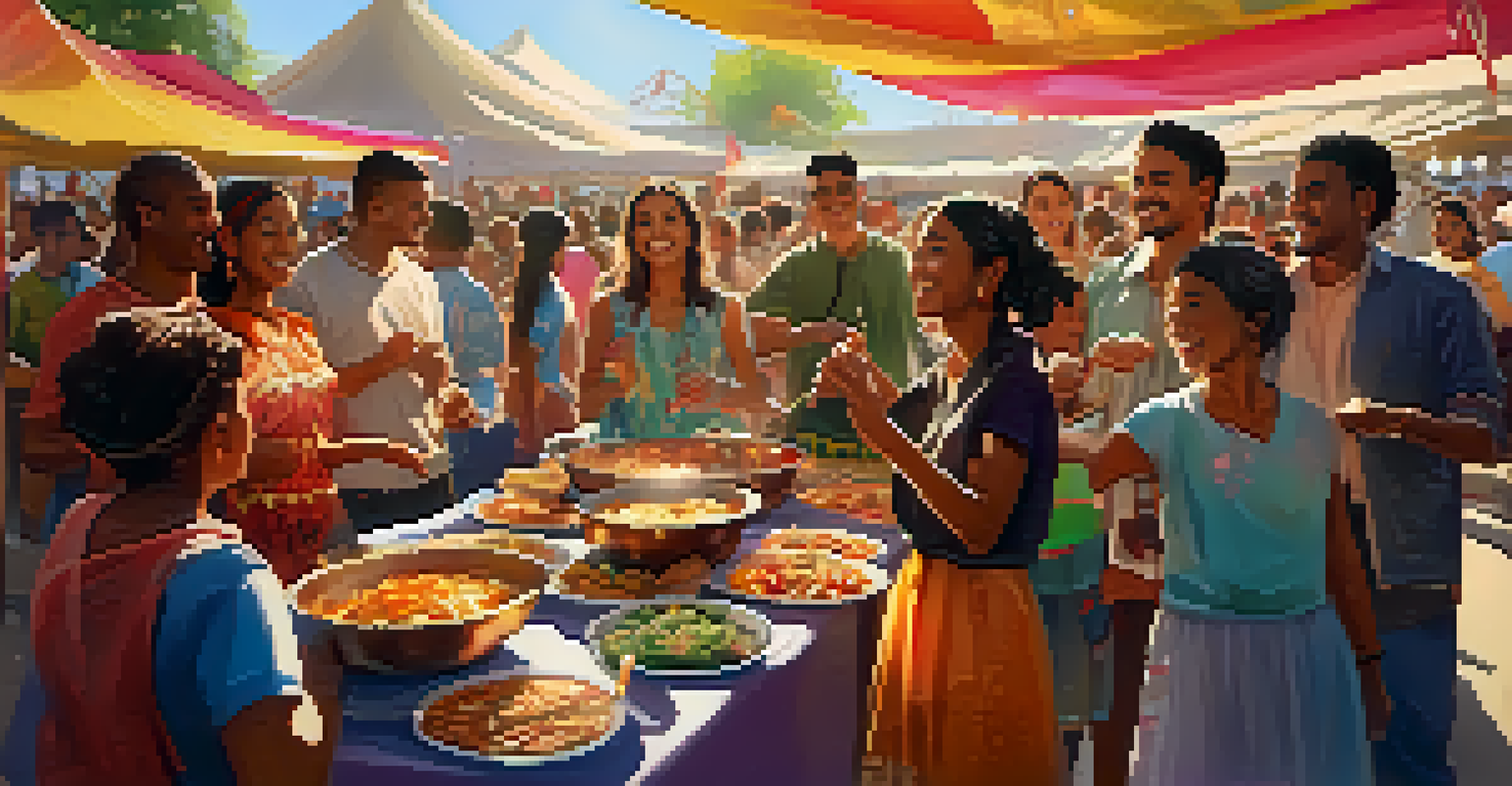Global Citizenship: Cultural Exchange and International Relations

Understanding Global Citizenship in Today's World
Global citizenship is a concept that encourages individuals to see themselves as part of a global community. It's about recognizing one's responsibilities and rights not just within a local or national context, but on a worldwide scale. This perspective fosters empathy and understanding, crucial traits for navigating our increasingly interconnected world.
The world is but a canvas to our imagination.
In essence, being a global citizen means appreciating cultural diversity and advocating for social justice. It encourages individuals to engage with global issues such as climate change, poverty, and inequality. By actively participating in these discussions, global citizens contribute to a more equitable and sustainable future for everyone.
As we embrace global citizenship, we also enhance our cultural competency. This skill allows us to communicate effectively with people from different backgrounds, enriching our personal and professional interactions. Ultimately, understanding global citizenship is about cultivating a mindset that values collaboration and respect in an ever-evolving global landscape.
The Role of Cultural Exchange in Fostering Connection
Cultural exchange is a powerful tool for building bridges between countries and communities. Through shared experiences, such as art, music, and food, individuals can gain insights into different ways of life. This exchange not only broadens perspectives but also challenges stereotypes and misconceptions, fostering deeper connections.

Programs like student exchanges, cultural festivals, and international collaborations highlight the importance of experiencing diverse cultures firsthand. These interactions create lasting relationships and promote mutual understanding, which are crucial for peaceful coexistence. When people connect on a personal level, they are more likely to work together towards common goals.
Global Citizenship Empowers Action
Understanding global citizenship encourages individuals to engage with pressing global issues like climate change and inequality.
Moreover, cultural exchange enriches our own culture by introducing new ideas and practices. Just as a recipe becomes more delicious with various ingredients, our societies thrive when we embrace diversity. This continuous interplay of cultures not only enhances creativity but also strengthens the fabric of global citizenship.
How Cultural Exchange Influences International Relations
International relations benefit greatly from cultural exchange, as it lays the groundwork for diplomacy and collaboration. When countries engage in cultural activities, they create a platform for dialogue and understanding. This helps in resolving conflicts, as shared cultural experiences can soften differences and foster goodwill.
We do not inherit the earth from our ancestors; we borrow it from our children.
For instance, cultural diplomacy initiatives, such as art exhibitions or musical performances, often serve as informal channels for communication between nations. These events can lead to more formal discussions on political or economic issues, demonstrating how culture can act as a catalyst for positive change. By building trust and respect, cultural exchange can pave the way for stronger diplomatic ties.
Additionally, international partnerships in education and research promote knowledge sharing and innovation. These collaborations not only enhance scientific and technological advancements but also deepen mutual respect among nations. As countries work together on global challenges, cultural exchange becomes a vital component in shaping harmonious international relations.
Global Citizenship Education: Preparing Future Leaders
Education plays a critical role in promoting global citizenship and cultural exchange. Schools and universities are increasingly incorporating global issues into their curricula, encouraging students to think critically about their role in the world. This educational approach not only informs students about global challenges but also inspires them to take action.
Experiential learning, such as study abroad programs and community service projects, allows students to immerse themselves in different cultures. These experiences foster empathy and understanding, equipping future leaders with the skills necessary to navigate complex global landscapes. By promoting cultural exchange within educational settings, we can cultivate a generation of informed global citizens.
Cultural Exchange Builds Connections
Cultural exchange fosters mutual understanding and collaboration, essential for peaceful coexistence in a diverse world.
Moreover, global citizenship education encourages collaboration and communication among diverse groups. Students learn to appreciate different perspectives, fostering a sense of solidarity and shared responsibility. Ultimately, this educational framework not only prepares individuals for successful careers but also empowers them to contribute positively to society.
Challenges of Cultural Exchange in Global Citizenship
While cultural exchange offers numerous benefits, it also faces challenges that can hinder its effectiveness. Miscommunication and cultural misunderstandings can arise, leading to unintended consequences. It's essential to approach cultural interactions with sensitivity and openness to ensure that the exchange is meaningful and respectful.
Additionally, power dynamics between cultures can create imbalances in cultural exchange. For instance, dominant cultures may overshadow smaller or marginalized ones, leading to a loss of authenticity and representation. To promote true global citizenship, it’s crucial to amplify diverse voices and ensure equitable participation in cultural exchanges.
Finally, the rise of nationalism and cultural isolationism in some regions poses a significant barrier to global citizenship. As individuals and nations retreat into their own cultural silos, opportunities for meaningful exchange diminish. Overcoming these challenges requires a collective commitment to fostering inclusivity and understanding across cultural boundaries.
The Impact of Technology on Cultural Exchange
Technology has revolutionized the way we engage in cultural exchange, breaking down geographical barriers and enabling instant communication. Social media, for example, allows individuals from different parts of the world to share their cultures, traditions, and stories at the click of a button. This accessibility fosters a sense of global community and encourages people to learn from one another.
Online platforms also facilitate virtual cultural exchanges, such as webinars, virtual tours, and collaborative projects. These initiatives make it possible for people to connect and collaborate without the need for physical travel. As a result, individuals can engage in cultural exchange even from the comfort of their homes, broadening their horizons and enhancing their understanding of global citizenship.
Technology Enhances Cultural Sharing
Advancements in technology facilitate cultural exchange by breaking down barriers and enabling instant communication across the globe.
Moreover, technology can help preserve cultural heritage by documenting and sharing traditional practices that may otherwise be lost. Digital archives, for instance, can store invaluable knowledge about languages, customs, and art forms. By leveraging technology, we can not only promote cultural exchange but also safeguard our diverse cultural legacies for future generations.
Looking Ahead: The Future of Global Citizenship
As we look to the future, the concept of global citizenship will continue to evolve alongside global challenges. Climate change, migration, and technological advancements will shape our understanding of what it means to be a global citizen. Embracing cultural exchange will be essential to navigating these complexities and building a more inclusive world.
In this context, fostering an environment that promotes global citizenship and cultural understanding is paramount. Educational institutions, governments, and organizations must work hand in hand to create opportunities for dialogue and collaboration. By prioritizing cultural exchange, we can empower individuals to take action and advocate for positive change on a global scale.

Ultimately, the future of global citizenship lies in our ability to embrace diversity and work together as a global community. By recognizing our shared humanity and the interconnectedness of our challenges, we can foster a world that values collaboration, empathy, and respect. Together, we can build a brighter future for all.